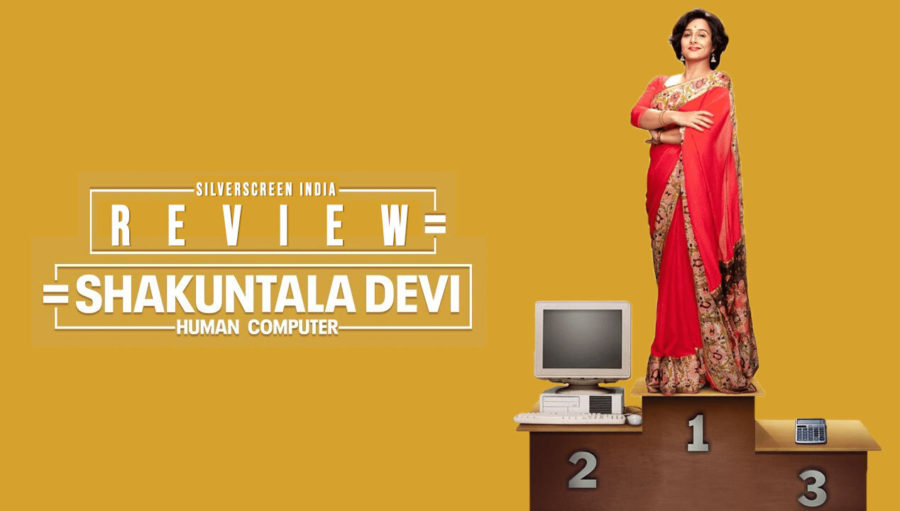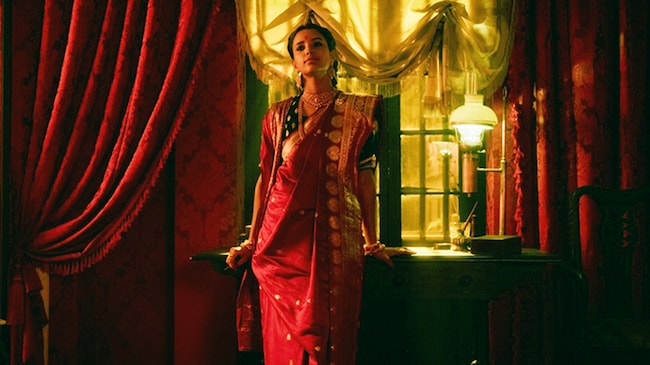Cast: Vidya Balan, Sanya Malhotra
Director: Anu Menon
Numbers make Shakuntala Devi, the world knows. Known as the “human computer”, numbers radiate from all sides of Shakuntala (Vidya Balan) as she stands next to a board and looks like she’s thinking about her next meal or the tea she had that afternoon. What’s perfunctory to her is genius and unimaginable to the rest of the world.
Numbers also flash when director Anu Menon puts the year on screen. The film jets across years and decades like numbers wandering in Shakuntala Devi’s head, giving us moments in her life that elevate our understanding of the woman behind the computer. It’s 2001 now, then 1934, it crosses seas to 1955 and reaches 1968 before a brief stopover in the late 90s and 80s. This biopic, finally a real one from Hindi cinema, is about that process. Throughout the film, the word “how” keeps popping up as everyone gapes in awe of Shakuntala Devi’s talent. It’s a process she’s unable to articulate herself. Menon and Nayanika Mahtani (who has penned the script alongside her), don’t chase that part of the mathematical prodigy.
Also read, Here’s A Woman Who Refused To Be Boxed In: How Anu Menon Found Shakuntala Devi
Shakuntala Devi begins with a note that it is based on a true story as seen through the eyes of a daughter, Anupama Banerji (Sanya Malhotra). It’s only fair that the film Shakuntala Devi demystifies the woman rather than her talent. This is not about the numbers.
Recommended
Shakuntala Devi comes from an all-women team. Apart from Anu Menon and Nayanika Mahtani, Ishita Moitra has written the dialogues, it is shot by Keiko Nakahara and edited by Antara Lahiri. To talk about gaze would be obvious, so the question again is the “how” of the film. When her father books a young Shakuntala for ten “shows”, we see the parallel it draws with women’s participation in other forms of entertainment and how this is inverted yet muted. Her early interactions where she’s effectively auditioning her talent, the rooms teem with men. The first instance where we see women as the audience is in a classroom of young girls discovering her magic. The film is about Shakuntala Devi, but it moves between the points of view of the mother and the daughter with the same ease with which it teleports across years. In 1955 London, we meet Tarabai (Sheeba Chaddha), who runs a paying guest accommodation, with two men in residence. Some explosive details are revealed to send the men into shock but nothing as shocking as seeing a woman there for the first time. They say it in as many words to which Tarabai retorts that she’s been there all along. Shakuntala Devi is the kind of film that tries to widen the latitude a woman is permitted in her definition and scope. It is usually limited by a gender role, a gifted talent, an ambition or lack thereof, timid or intrepid. Anu Menon designs this film not just as Shakuntala’s biopic but also to insist on something larger, that the conjunction is “and”, seldom “or”. Shakuntala Devi, the film and the woman, contain multitudes.
Rarely, if ever, has an Indian biopic begun with a negative arc of its principal character. Shakuntala Devi begins as we see her daughter Anupama walk in with her lawyer. She has slapped a case on her mother for destroying her financially. And we see this friction in their relationship in nuggets of interactions as they live a nomadic life between hotels and performances. When little Anu is unhappy with the move to London, she complains that the weather is nothing like in Enid Blyton’s books in letters to her father.
The film is full of delicious humour in offhand moments (when someone says, “next level”, Shakuntala says “three floors?” and later exclaims the same when she buys a house of her own). As her mother performs mathematics on stage, Anu is performative in her daughterly ways, the detachment palpable as we observe Shakuntala, someone who grew up hating her mother, and Anu, someone in whom the same seeds are being sown. We don’t get the events in the chronological order but there is a Shakuntala-esque genius in the way Menon and Mahtani have structured their script too, the sum of its parts drawing a picture of a relationship that has always been at odds and yet retains symmetry in the way the cycle repeats itself. Shakuntala, the human computer, is a go-getter while Shakuntala, the mother, thrives in seeing her daughter in her shadows. Menon dials the tone of the film all the way up that helps Vidya Balan and Sanya Malhotra extract this dynamic culminating in them meeting halfway.
The scene and timeline transitions from Menon are thoughtful, rendering a brisk entertaining narrative pace to the film. When Anu refers to her husband (Amit Sadh as the genial Abhay) as the second biggest fool in the planet, he asks who is number one, and we move back in time to meet Jisshu Sengupta as Paritosh Banerji, her father and the man Shakuntala was married to. Shakuntala’s progressive nature is distributed naturally, be it taking to London’s hyper masculine academic atmosphere or warming up to and charming people from every part of the world, discarding the information that Paritosh is a divorcee like a cigarette butt, and writing a book on homosexuality in the 1970s. The film incorporates interesting visual idioms in its cyclical structure. When Paritosh and Shakuntala are in a restaurant talking about Anu, we see their reflections behind them on a glass wall, their past relationship reduced to an understanding friendship as Paritosh convinces her to put Anu in a boarding school. We later see Anu and Abhay reflected in a mirror as Anu fights her motherly instincts that threaten to derail her career. As Shakuntala decides to go on her tour, the camera follows her, from Paritosh cradling a young Anu to Shakuntala stepping out the door. When the couple decide to part, Shakuntala takes Anu with her, the camera pans inwards, creating a distance between us and Paritosh just as Shakuntala leaves a trail behind him.
Anu Menon’s film is about autonomy. Neither Shakuntala nor Anu enjoy a hold on each other’s life, they are their own people first. The same way Anu doesn’t have to be her father’s spokesperson for the lie that Shakuntala tells the world. Vidya Balan embodies this autonomy and gives it singular vigour. When Shakuntala says she’s amazing and not normal, we know she believes it. That makes the display a simple fact, negating any hint of arrogance. She employs little ticks from a head turn that smacks of impudence or the gentle gait she takes to as she ages, and her propensity to break stuff. The young Shakuntala’s enthusiasm is visible in her physicality and the older Shakuntala’s in her voice and delivery. The insecurity of a mother is truly felt when she returns to her childhood home as the daughter that she used to be. This event might be real or could just be a dark corner of her mind lighting up. Shakuntala can calculate root of two-hundred-digit numbers but Anu Menon shows us more by drawing her back to her roots.
The Shakuntala Devi review is a Silverscreen original article. It was not paid for or commissioned by anyone associated with the film. Silverscreenindia.com and its writers do not have any commercial relationship with movies that are reviewed on the site.



